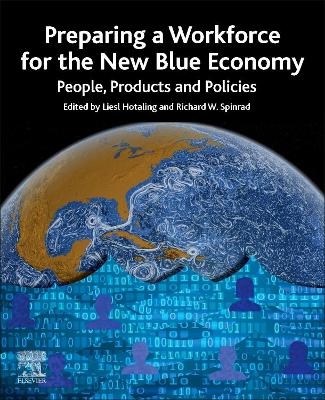
Preparing a Workforce for the New Blue Economy
Elsevier Science Publishing Co Inc (Verlag)
978-0-12-821431-2 (ISBN)
Liesl Hotaling, President of Eidos Education, has spent the past 20 years creating hands-on science and technology educational projects for students and educators. She specializes in real time data education projects and hands-on science, technology, engineering and mathematics (STEM) educational projects supporting environmental observing networks. She holds a B.A. in Marine Science from Fairleigh Dickinson University, a M.A.T. in Science Teaching from Monmouth University, and a M.S. in Maritime Systems from Stevens Institute of Technology. Dr. Richard Spinrad, Under Secretary of Commerce and Administrator of the National Oceanic and Atmospheric Administration (NOAA), Professor Emeritus of Oceanography at Oregon State University (OSU), past member of the Ocean Studies Board of the National Academies, and a past President of the Marine Technology Society. In 2016 he retired as Chief Scientist of the NOAA, as appointed by President Barack Obama. Dr. Spinrad was the Vice President for Research at OSU, and previously was the head of NOAA’s Research Office and the National Ocean Service. He co-led the White House Committee developing the nation’s first set of ocean research priorities. Dr. Spinrad was a Senior Executive with the U.S. Navy, where he was awarded the Distinguished Civilian Service Award (highest civilian award in the Navy). He held faculty appointments at three universities, served as Executive Director at the Consortium for Oceanographic Research and Education, and was President of Sea Tech, Inc. He also created the National Ocean Sciences Bowl. Dr. Spinrad was the U.S. permanent representative to the United Nations’ Intergovernmental Oceanographic Commission. Spinrad received Presidential Rank Awards from Presidents Bush and Obama, is past president of The Oceanography Society, and is a Fellow of 3 professional societies. Dr. Spinrad holds degrees from The Johns Hopkins University and OSU.
Preparing a Workforce for the New Blue Economy
Foreword
List of Contributors
Acknowledgements
Section I. Exploration and Observation
1. Exploration And Technology – Key Building Blocks For The New Blue Economy
2. Technical Advancements to Improve Ocean Observation
3. Ocean Observing Requires a New Blue Economy Workforce
4. Ocean Modeling
5. Propelling the New Blue Economy with Safer Marine Transportation and Infrastructure
Section II. Defining the new Blue Economy
6. The New Blue Economy
7. Market Analysis of the New Blue Economy
8. The Importance of the New Blue Economy to a Sustainable Blue Economy
Section III. Programs that Deliver
Fisheries
9. A New Blue Economy: Connecting ocean information with the needs of the recreational and commercial fishing industry
Interview: Recreational Fishing
Interview: Ocean observing and the New Blue Economy Impacts on Business - Aquaculture
Energy
10. Marine Energy Contribution to the New Blue Economy
11. Using Science to Safely Tap Energy and Minerals from the Sea: Role of the U.S. Bureau of Ocean Energy Management
Interview: Ocean Data use in the Oil and Gas Industry
12. Influences and impact of the energy industry on the New Blue Economy and its workforce development
Health
13. Oceans and Human Health and the New Blue Economy
Interview: Human Health and Cholera
Interview: Harmful Algal Blooms (HABs)
14. Biological Information For The New Blue Economy And The Emerging Role Of eDNA
Homeland Security
15. National Security and the New Blue Economy
Environment
16. The New Blue Economy in the American Arctic: Challenge and Opportunity in the 21st Century
Interview: Marine Litter
Interview: Entreprenuer utilizing ocean data and drones for ocean surveys
17. Tsunami Hazard and the New Blue Economy
18. Rising Sea Level
Interview: Surfing
19. Seafloor mapping
Section IV. Mechanisms for Growth
20. Australia’s Blue Economy Cooperative Research Centre
Case Study: The New Blue Economy: People, Products, and Policies
Case Study: Marine Industries Science and Technology (MIST) Cluster
Case Study: Centre for Ocean Ventures and Entrepreneurship (COVE)
Interview: Industry Trends
Op/Ed: Enhancing Ocean Observing through Collaborations
Section V. Building the Workforce
21. Preparing the Workforce for the New Blue Economy
22. Workforce Development and Leadership Training for the New Blue Economy
Case Study: RUCOOL Operational Oceanography Masters – Workforce Development Case Study
Op/Ed: Overcoming Roadblocks and Charting a Course Forward to the New Blue Economy: An African American Woman’s Perspective on Being the First
23. Developing Technician Education Programs for the New Blue
Op/Ed: Big Ocean Data
Op/Ed: How to Prepare the Workforce for the New Blue Economy?
Interview: Early Career Ocean Professionals
Interview: Traditional Ecological Knowledge
24. Building an Inclusive and Equitable New Blue Economy
Op/Ed: The New Blue Workforce: A Case for Diversity, Equality and Inclusion by Design
Interview: Veteran Workforce Opportunities
Interview: Professional Certifications
Op/Ed: Role of Certifications in Education Programs
Section VI. Policies that Facilitate
25. Domestic Opportunities to Advance Blue Economy Priorities
26. Government Action and the New Blue Economy
27. UN Decade Perspective
28. A Sustainable New Blue Economy
Op/Ed: Risk Tolerance
Section VII. Final Thoughts
Author Index
Author Biographies
Subject Index
| Erscheinungsdatum | 08.06.2021 |
|---|---|
| Sprache | englisch |
| Maße | 152 x 229 mm |
| Gewicht | 1020 g |
| Themenwelt | Naturwissenschaften ► Biologie ► Ökologie / Naturschutz |
| Naturwissenschaften ► Geowissenschaften ► Hydrologie / Ozeanografie | |
| ISBN-10 | 0-12-821431-7 / 0128214317 |
| ISBN-13 | 978-0-12-821431-2 / 9780128214312 |
| Zustand | Neuware |
| Haben Sie eine Frage zum Produkt? |
aus dem Bereich


